Materials
Theory, methods and computational algorithms for simulating matter at lenghtscales (and relevant timescales) from atomic to nano to meso at levels of detail ranging from full ab initio quantum mechanics, to classical atomistic, to coarse-grained to continuum models.
Problems we study using these techniques include molecules (e.g. drugs, catalysts, fuels), crystalline and amorphous materials (e.g. semiconductors, alloys), nanostructures (e.g. carbon nanotubes, nanocrystals), biomolecules and biomolecular assemblies (DNA, protein-drug complexes, cell components).
For queries about this topic, contact Chris-Kriton Skylaris.
View the calendar of events relating to this topic.
Projects
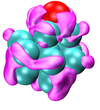
Ab initio simulations of chemical reactions on platinum nanoparticles
Chris-Kriton Skylaris (Investigator), Álvaro Ruiz-Serrano, Peter Cherry
•Use first principles calculations to study the relationship between shape and size of nanoparticle and the oxygen adsorption energy.
• Investigate the effect of high oxygen coverage on the catalytic activity of the nanoparticles.

Centre for Doctoral Training in Next Generation Computational Modelling
Hans Fangohr, Ian Hawke, Peter Horak (Investigators), Susanne Ufermann Fangohr, Thorsten Wittemeier, Kieran Selvon, Alvaro Perez-Diaz, David Lusher, Ashley Setter, Emanuele Zappia, Hossam Ragheb, Ryan Pepper, Stephen Gow, Jan Kamenik, Paul Chambers, Robert Entwistle, Rory Brown, Joshua Greenhalgh, James Harrison, Jonathon Waters, Ioannis Begleris, Craig Rafter
The £10million Centre for Doctoral Training was launched in November 2013 and is jointly funded by EPSRC, the University of Southampton, and its partners.
The NGCM brings together world-class simulation modelling research activities from across the University of Southampton and hosts a 4-year doctoral training programme that is the first of its kind in the UK.
Computational chemistry study on the interaction mechanism of imidazolium based ionic liquid lubricants with metal surface
Ugur Mart (Investigator)
We propose a fundamental research to investigate the interaction mechanism of ionic liquids (ILs) with metal surfaces, molecular structure and organization on the surface along with chemical reactions using computational chemistry methods at molecular level.

Designer 3D Magnetic Mesostructures
Hans Fangohr (Investigator), Matteo Franchin, Andreas Knittel
A new electrodeposition self-assembly method allows for the growth of well defined mesostructures. This project's aim is to use this method in order to fabricate supraconducting and ferromagnetic mesostructures. Numerical methods based on well-established models are used in order to characterise the grown structures.
Development of wide-ranging functionality in ONETEP
Chris-Kriton Skylaris (Investigator), Jacek Dziedzic
ONETEP is at the cutting edge of developments in first principles calculations. However, while the fundamental difficulties of performing accurate first-principles calculations with linear-scaling cost have been solved, only a small core of functionality is currently available in ONETEP which prevents its wide application. In this collaborative project between three Universities, the original developers of ONETEP will lead an ambitious workplan whereby the functionality of the code will be rapidly and significantly enriched.
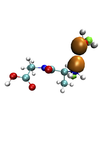
Dipole moment and theoretical spectroscopy: a computational approach
Chris-Kriton Skylaris (Investigator), Valerio Vitale
The present project represents a first step towards the implementation of a new technique to calculate the whole vibrational spectra of molecules in a formally exact way, which fully takes into account anharmonicity and conformational transitions, at a finite temperature, both in gas phase and in solution in a single ab initio molecular dynamics simulation.

Directing magnetic skyrmion traffic flow with nanoscale patterning.
Hans Fangohr (Investigator), Mark Vousden
Skyrmions in magnetic nanostructures may lead to new data storage technologies. Appropriate simulation methodologies are developed and applied.

Dynamag: computational magnonics
Hans Fangohr, Atul Bhaskar (Investigators), Matteo Franchin, Andreas Knittel
Analytical treatment of long range magneto-dipole interactions is a bottle-neck of magnonics and more generally of the theory of spin waves in non-uniform media. This project develops a theoretical framework for analysis of magnonic phenomena in magnetic nano-structures, including isolated nano-elements, arrays of those, and extended magnonic crystals. The DYNAMAG project is funded by the EU FP7 and the DST of India.
Dynamics of interacting magnetic nanostructures
Hans Fangohr (Investigator), Maximilian Albert
Individual ferromagnetic objects of dimensions of order of 100nm provide a wealth of complex phenomena, both in static and dynamic behaviour. This project focuses on the dynamics of interacting ferromagnetic nano structures.

First Principles Simulation of Glycine Adsorption to Amorphous Silica
Chris-Kriton Skylaris (Investigator), Benjamin Lowe
Understanding the molecular interactions between silica and biomolecules is an important in the fields of Bionanotechnology, Biomimetic Material Science and Prebiotic Chemistry. DFT calculations were performed based on a literature study to better understand the interaction between silica and glycine.

Fluid Structure Interactions of Yacht Sails
Stephen Turnock (Investigator), Daniele Trimarchi
The research is the main subject of the PhD topic. It regards the application of fluid structure interaction techniques to the domain of yacht sails simulation
Imaging ultrasonic Lamb wave patterns
Visualizing ultrasonic Lam wave patterns using deflectometry and comparison with multiphysics FE results.
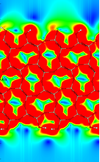
Investigation into the Interfacial Physics of Field Effect Biosensors
Nicolas Green, Chris-Kriton Skylaris (Investigators), Benjamin Lowe
This interdisciplinary research aims to improve understanding of Field Effect Transistor Biosensors (Bio-FETs) and to work towards a multiscale model which can be used to better understand and predict device response.
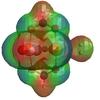
Investigation of gas adsorption of metal-organic frameworks using quantum mechanics and Monte Carlo simulation
Jia Huo (Investigator)
Metal organic frameworks (MOFs) has received much attention in the field of gas storage/separation, catalysis, etc, due to their highly ordered porosity, high surface area, multi functionality, chemically talorability and high loading of meta sites. Experimental method has contributed to these areas, but there are still plenty of problems not solved solely from experiment, including investigation of mechanism of adsorption and screening MOFs for target-specific applications. In this project, we plan to use quantum mechanics and Monte Carlo simulation to investigate the various guest adsorption properties on MOFs to screen the substrates catalysed by active sites within MOFs and the influence of transition metal sites of MOFs on gas adsorption for design of MOFs with high gas storage capacity.
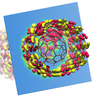
Large-Scale Quantum Chemistry Simulations of Organic Photovoltaics
Chris-Kriton Skylaris (Investigator), Gabriele Boschetto
The aim of this project is to use first principles quantum mechanical calculations to provide a detailed atomic-level understanding of OPV materials and models of bulk heterojunctions on a far larger scale than possible before by using the ONETEP program for linear-scaling first principles quantum mechanical calculations.

Laser-Induced Forward Transfer Nano-Printing Process - Multiscale Modelling, Experimental Validation and Optimization
Kai Luo, Rob Eason (Investigators)
LIFT is a direct-write microfabrication and micro/nano printing technique that has received much attention in the research communities and industries in recent years. It offers significant advantages over other competing printing methodologies and has potential applications in many high-tech high-value industries. The method is modelled, studied and optimised using computational techniques in this work.

Life assessment methods for industrial steam turbine blade to disc interfaces
Katherine Soady (Investigator)
This is an EngD project sponsored by E.ON New Build and Technology Ltd. which aims to develop the methods currently implemented in life assessment of industrial steam turbine blade to disc interfaces to take account of the surface treatment process (shot peening) which is applied to component before service and after repair.

Magnetic dynamics under the Landau-Lifshitz-Baryakhtar equation
Hans Fangohr (Investigator), Weiwei Wang
Magnetic dynamics using the Landau-Lifshitz-Baryakhtar (LLBar) equation that the nonlocal damping is included as well as the scalar Gilbert damping.

Magnon-Driven Domain-Wall Dynamics in the presence of Dzyaloshinskii-Moriya Interaction
Hans Fangohr (Investigator), Weiwei Wang
The domain wall motion induced by spin waves (magnons) in the presence of Dzyaloshinskii-Moriya Interaction is studied in this project.
Micromagnetic simulation of Magnetoelectric Multiferroics
Hans Fangohr (Investigator), Rebecca Carey
The focus of this project is towards the understanding of the magnetic and electric couplings in multiferroic materials, in order to create a magnetoelectric micromagnetic model.

Microstructural modeling of skin mechanics
Georges Limbert (Investigator), Emanuele Zappia
Microstructural modeling of skin mechanics to gain a mechanistic insight into the biomechanics of the skin.
Multi-Scale Modelling of Composite Riser Systems
Adam Sobey (Investigator), Hossam Ragheb
There is an ever increasing interest in exploiting ocean resources at greater depths. At these depths composite materials have a larger separation, in terms of benefits, from traditional steel structures as they offer lower maintenance costs, low weight and high durability. However, there are limited current examples of using composites for these applications meaning that empirical knowledge and specific computational tools are limited. As an example of this lack of knowledge current design guidance gives fatigue safety factors in a range of 15-50. Development of more accurate computational tools will allow an increase in safety and/or reduction of the structure.
A key aspect to increasing the usage of flexible composite risers is the ability to assess the reliability of such structures. Importance Sampling Simulation is becoming the preferred method to assess structures which ideally requires a fast and accurate structural modelling method. Whilst Finite Element Methods can provide an accurate solution to these problems they are slow to run. It is therefore proposed to investigate the use of multiscale modelling to investigate the reliability of such structures. This will involve the development of: a full-scale model to be run in conjunction with fluid mechanics simulations, a higher resolution model to investigate the fatigue hotspot near the seabed and a more local model to simulate the fatigue growth.

Nmag - computational micromagnetics
Hans Fangohr, Thomas Fischbacher (Investigators), Matteo Franchin, Andreas Knittel, Maximilian Albert, Dmitri Chernyshenko, Massoud Najafi, Richard Boardman
Nmag is a micromagnetic simulation package based on the general purpose multi-physics library nsim. It is developed by the group of Hans Fangohr and Thomas Fischbacher in the School of Engineering Sciences at the University of Southampton and released under the GNU GPL.

OpenDreamKit
Hans Fangohr (Investigator), Marijan Beg
OpenDreamKit is a [Horizon 2020](https://ec.europa.eu/programmes/horizon2020/) European Research Infrastructure project (#676541) providing substantial funding to the open-source computational mathematics ecosystem, and in particular popular tools such as LinBox, MPIR, SageMath, GAP, Pari/GP, LMFDB, Singular, MathHub, and the IPython/Jupyter interactive computing environment.
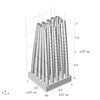
Optical Characterisation of Black Silicon for Photovoltaics Using the Finite Element Method
Jack Tyson (Investigator)
Here we present a novel method of simulating the reflectance spectra of black silicon solar cells using the finite element method. Designed in COMSOL Multiphysics is a new set of algorithm-controlled-geometries rendering a vast array of different structural permutations of silicon nanowires. Our model focused on the variation of this geometry within customisable predefined conditions in large output quantities, collated and averaged to reliably determine the reflectance of an entire black silicon solar cell.

Skyrmionic states in confined nanostructures
Hans Fangohr (Investigator), Marijan Beg
An ever increasing need for data storage creates great challenges for the development of high-capacity storage devices that are cheap, fast, reliable, and robust. Because of the fundamental constraints of today's technologies, further progress requires radically different approaches. Magnetic skyrmions are very promising candidates for the development of future low-power, high-capacity, non-volatile data storage devices.

Stability of chiral structures in magnetic nanodisks
Hans Fangohr, Weiwei Wang (Investigators), David Cortes
This project is aimed to study the stability of skyrmionic and helical equilibrium states in magnetic nanodisks, using computational simulations.
The ONETEP project
Chris-Kriton Skylaris (Investigator), Stephen Fox, Chris Pittock, Álvaro Ruiz-Serrano, Jacek Dziedzic
Program for large-scale quantum mechanical simulations of matter from first principles quantum mechanics. Based on theory and algorithms we have developed for linear-scaling density functional theory calculations on parallel computers.

Vibrational spectroscopy from ab initio molecular dynamics
Hans Fangohr, Chris-Kriton Skylaris (Investigators), Valerio Vitale
In this project I used the Fourier transform of the time correlation function (FTTCF) formalism, that allows to compute the vibrational spectra of molecules both in gas and condensed phase, at finite temperature, in a single ab initio molecular dynamics simulation.

Vortex Dynamics in High-Tc superconductors
Hans Fangohr (Investigator)
The dynamics of vortices in high temperature superconductors exhibits the complex and rich physics we expect from many body systems with competing interactions. Molecular Dynamics, Langevin Dynamics and Monte Carlo Computer simulations are carried out to understand this system in more detail.
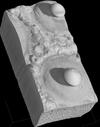
µ-VIS Computed Tomography Centre
Ian Sinclair, Richard Boardman, Dmitry Grinev, Philipp Thurner, Simon Cox, Jeremy Frey, Mark Spearing, Kenji Takeda (Investigators)
A dedicated centre for computed tomography (CT) at Southampton, providing complete support for 3D imaging science, serving Engineering, Biomedical, Environmental and Archaeological Sciences. The centre encompasses five complementary scanning systems supporting resolutions down to 200nm and imaging volumes in excess of one metre: from a matchstick to a tree trunk, from an ant's wing to a gas turbine blade.
People
 Simon Cox
Simon CoxProfessor, Engineering Sciences (FEE)
 Graeme Day
Graeme DayProfessor, Chemistry (FNES)
 Rob Eason
Rob EasonProfessor, Optoelectronics Research Centre
 Hans Fangohr
Hans FangohrProfessor, Engineering Sciences (FEE)
 Jeremy Frey
Jeremy FreyProfessor, Chemistry (FNES)
 Kai Luo
Kai LuoProfessor, Engineering Sciences (FEE)
 Ian Sinclair
Ian SinclairProfessor, Engineering Sciences (FEE)
 Mark Spearing
Mark SpearingProfessor, Engineering Sciences (FEE)
 Stephen Turnock
Stephen TurnockProfessor, Engineering Sciences (FEE)
 Nicolas Green
Nicolas GreenReader, Electronics and Computer Science (FPAS)
 Peter Horak
Peter HorakReader, Optoelectronics Research Centre
 Tiina Roose
Tiina RooseReader, Engineering Sciences (FEE)
 Atul Bhaskar
Atul BhaskarSenior Lecturer, Engineering Sciences (FEE)
 Ian Hawke
Ian HawkeLecturer, Mathematics (FSHS)
 Denis Kramer
Denis KramerLecturer, Engineering Sciences (FEE)
 Georges Limbert
Georges LimbertLecturer, Engineering Sciences (FEE)
 Marcus Newton
Marcus NewtonLecturer, Physics & Astronomy (FPAS)
 Chris-Kriton Skylaris
Chris-Kriton SkylarisLecturer, Chemistry (FNES)
 Philipp Thurner
Philipp ThurnerLecturer, Engineering Sciences (FEE)
 Richard Boardman
Richard BoardmanSenior Research Fellow, Engineering Sciences (FEE)
 Philip Williamson
Philip WilliamsonSenior Research Fellow, Biological Sciences (FNES)
 Jacek Dziedzic
Jacek DziedzicResearch Fellow, Chemistry (FNES)
 Dmitry Grinev
Dmitry GrinevResearch Fellow, Engineering Sciences (FEE)
 Jia Huo
Jia HuoResearch Fellow, Chemistry (FNES)
 Ugur Mart
Ugur MartResearch Fellow, Engineering Sciences (FEE)
 Nina Podoliak
Nina PodoliakResearch Fellow, Physics & Astronomy (FPAS)
 Maximilian Albert
Maximilian AlbertPostgraduate Research Student, Engineering Sciences (FEE)
 Ioannis Begleris
Ioannis BeglerisPostgraduate Research Student, Engineering Sciences (FEE)
 Gabriele Boschetto
Gabriele BoschettoPostgraduate Research Student, Engineering Sciences (FEE)
 Rory Brown
Rory BrownPostgraduate Research Student, Civil Engineering & the Environment (FEE)
 Rebecca Carey
Rebecca CareyPostgraduate Research Student, Engineering Sciences (FEE)
 Paul Chambers
Paul ChambersPostgraduate Research Student, Engineering Sciences (FEE)
 Dmitri Chernyshenko
Dmitri ChernyshenkoPostgraduate Research Student, Engineering Sciences (FEE)
 Peter Cherry
Peter CherryPostgraduate Research Student, Chemistry (FNES)
 David Cortes
David CortesPostgraduate Research Student, Engineering Sciences (FEE)
 Enrique Cuan-Urquizo
Enrique Cuan-UrquizoPostgraduate Research Student, Engineering Sciences (FEE)
 Robert Entwistle
Robert EntwistlePostgraduate Research Student, Engineering Sciences (FEE)
 Stephen Fox
Stephen FoxPostgraduate Research Student, Chemistry (FNES)
 Stephen Gow
Stephen GowPostgraduate Research Student, Engineering Sciences (FEE)
 Joshua Greenhalgh
Joshua GreenhalghPostgraduate Research Student, Engineering Sciences (FEE)
 James Harrison
James HarrisonPostgraduate Research Student, Engineering Sciences (FEE)
 Benjamin Lowe
Benjamin LowePostgraduate Research Student, Electronics and Computer Science (FPAS)
 David Lusher
David LusherPostgraduate Research Student, Engineering Sciences (FEE)
 Alvaro Perez-Diaz
Alvaro Perez-DiazPostgraduate Research Student, Engineering Sciences (FEE)
 Maximillian Phipps
Maximillian PhippsPostgraduate Research Student, Chemistry (FNES)
 Chris Pittock
Chris PittockPostgraduate Research Student, Chemistry (FNES)
 Craig Rafter
Craig RafterPostgraduate Research Student, Engineering Sciences (FEE)
 Hossam Ragheb
Hossam RaghebPostgraduate Research Student, Engineering Sciences (FEE)
 Álvaro Ruiz-Serrano
Álvaro Ruiz-SerranoPostgraduate Research Student, Chemistry (FNES)
 Kieran Selvon
Kieran SelvonPostgraduate Research Student, Engineering Sciences (FEE)
 Ashley Setter
Ashley SetterPostgraduate Research Student, Engineering Sciences (FEE)
 Katherine Soady
Katherine SoadyPostgraduate Research Student, Engineering Sciences (FEE)
 Adam Sobey
Adam SobeyPostgraduate Research Student, Engineering Sciences (FEE)
 Alex Stuikys
Alex StuikysPostgraduate Research Student, Electronics and Computer Science (FPAS)
 Daniele Trimarchi
Daniele TrimarchiPostgraduate Research Student, Engineering Sciences (FEE)
 Jack Tyson
Jack TysonPostgraduate Research Student, Electronics and Computer Science (FPAS)
 Valerio Vitale
Valerio VitalePostgraduate Research Student, Electronics and Computer Science (FPAS)
 Jonathon Waters
Jonathon WatersPostgraduate Research Student, Engineering Sciences (FEE)
 Thorsten Wittemeier
Thorsten WittemeierPostgraduate Research Student, Engineering Sciences (FEE)
 Pete Wright
Pete WrightPostgraduate Research Student, Engineering Sciences (FEE)
 Emanuele Zappia
Emanuele ZappiaPostgraduate Research Student, Engineering Sciences (FEE)
 Petrina Butler
Petrina ButlerAdministrative Staff, Research and Innovation Services
 Susanne Ufermann Fangohr
Susanne Ufermann FangohrAdministrative Staff, Civil Engineering & the Environment (FEE)
 Thomas Fischbacher
Thomas FischbacherAlumnus, Engineering Sciences (FEE)
 Matteo Franchin
Matteo FranchinAlumnus, Engineering Sciences (FEE)
 Jan Kamenik
Jan KamenikAlumnus, University of Southampton
 Andreas Knittel
Andreas KnittelAlumnus, Industry
 Massoud Najafi
Massoud NajafiAlumnus, Arbeitsbereich Technische Informatik Systeme, University of Hamburg, Germany
 Kenji Takeda
Kenji TakedaAlumnus, Engineering Sciences (FEE)
 Weiwei Wang
Weiwei WangAlumnus, Ningbo University
 Marijan Beg
Marijan BegExternal Member, Imperial College London
 Mark Vousden
Mark VousdenExternal Member, University of Southampton
 Zheng Jiang
Zheng JiangNone, None
 Andrea Silva
Andrea SilvaNone, None